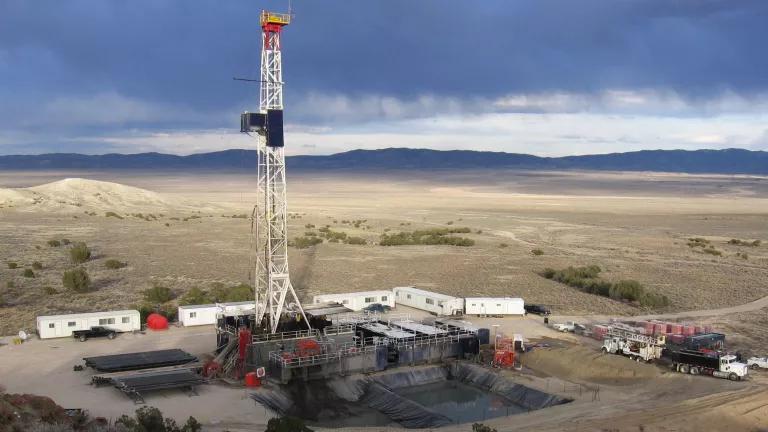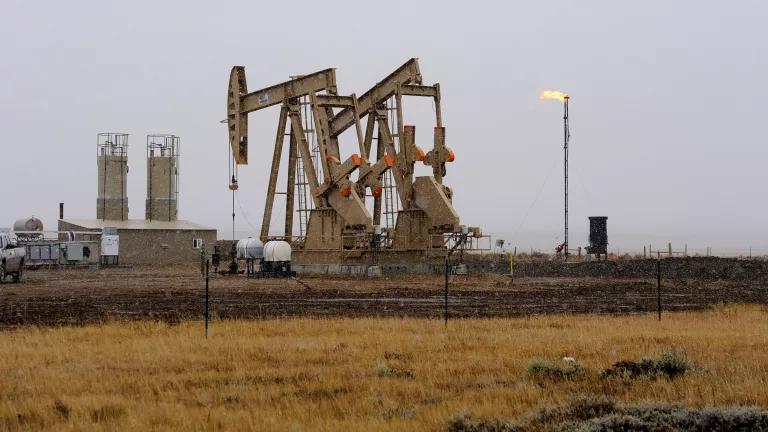O&G Leasing on Horizon Brings Calls for Immediate Reforms
Today, in two separate requests to the administration, groups are calling for the Department of the Interior (DOI) to finally deliver on long-promised reforms to the antiquated onshore oil and gas program. Despite numerous calls from government watchdogs, an executive order pressing for reforms, and publication of a report detailing needed reforms, action from DOI continues to lag.

Oil well on public land in New Mexico
Today, in two separate requests to the administration, groups are calling for the Department of the Interior (DOI) to finally deliver on long-promised reforms to the antiquated onshore oil and gas program. Despite numerous calls from government watchdogs, an executive order pressing for reforms, and publication of a report detailing needed reforms, action from DOI continues to lag.
The federal onshore oil and gas program, which is overseen by the Bureau of Land Management, is in need of serious reform and eventual phaseout. As we’ve explained in numerous previous posts, the current system cheats taxpayers, unnecessarily hands over rights to public lands to companies with little interest in developing them, and fails to ensure that pollution caused by production and its aftermath is mitigated or stopped.
Today, in a formal petition under the Administrative Procedure Act, a number of organizations, including NRDC, have petitioned DOI and BLM to finally address government watchdog red flags and immediately institute a rulemaking to update federal bonding levels. Bonds are meant to be paid by companies upfront to ensure that money is on hand when production ends to fully clean up and mitigate the impacts of drilling on public lands. But current bonding requirements—which were last updated more than 60 years ago—completely fail to account for the costs of plugging and cleaning up oil and gas wells once companies stop producing. The result is a toxic, expensive legacy that is leaving taxpayers on the hook to clean up industry’s mess. And the bill—which is estimated to be at least $6 billion for orphaned federal wells—continues to grow.
But insufficient bonding levels are only the tip of the iceberg when it comes to needed reforms. In a separate letter to DOI, 27 organizations called on Secretary Haaland to immediately proceed with the department’s long-delayed and oft-promised package of reforms to the federal onshore oil and gas program. The reforms sought include:
- Formal implementation of the Inflation Reduction Act’s fiscal policy changes, which included increased royalty rates, increased minimum bids, increased rents, a new expression of interest fee, and an end to non-competitive leasing;
- Ending the practice of leasing lands with little chance of development and improving transparency through better Tribal consultation and public participation; and
- Ensuring DOI and BLM’s management of public lands lives up to the conservation and stewardship standards required by law to ensure that landscapes, wildlife, and critical ecosystems remain protected into the future.
Reforming this broken system is a first step. It will ensure that taxpayers are being fairly compensated for the extraction of public resources, that they are not left footing the bill for industry’s harms, and that the extent of oil and gas leasing is limited, at the very least, to lands with the potential for development.
But these first actions are just the beginning. In a world facing immediate pressures to cease fossil fuel development, production, and use, the federal oil and gas program must be brought to an eventual end. This will require close and careful work with the states and communities that remain over-reliant on federal payments from this system to ensure that their economies and workforces diversify into new sectors. And communities on the front lines must be provided with the resources necessary to ensure that the legacy of pollution and environmental harms caused by industry are remedied and that a stable economic future, free from fossil fuel extraction, can be realized.




